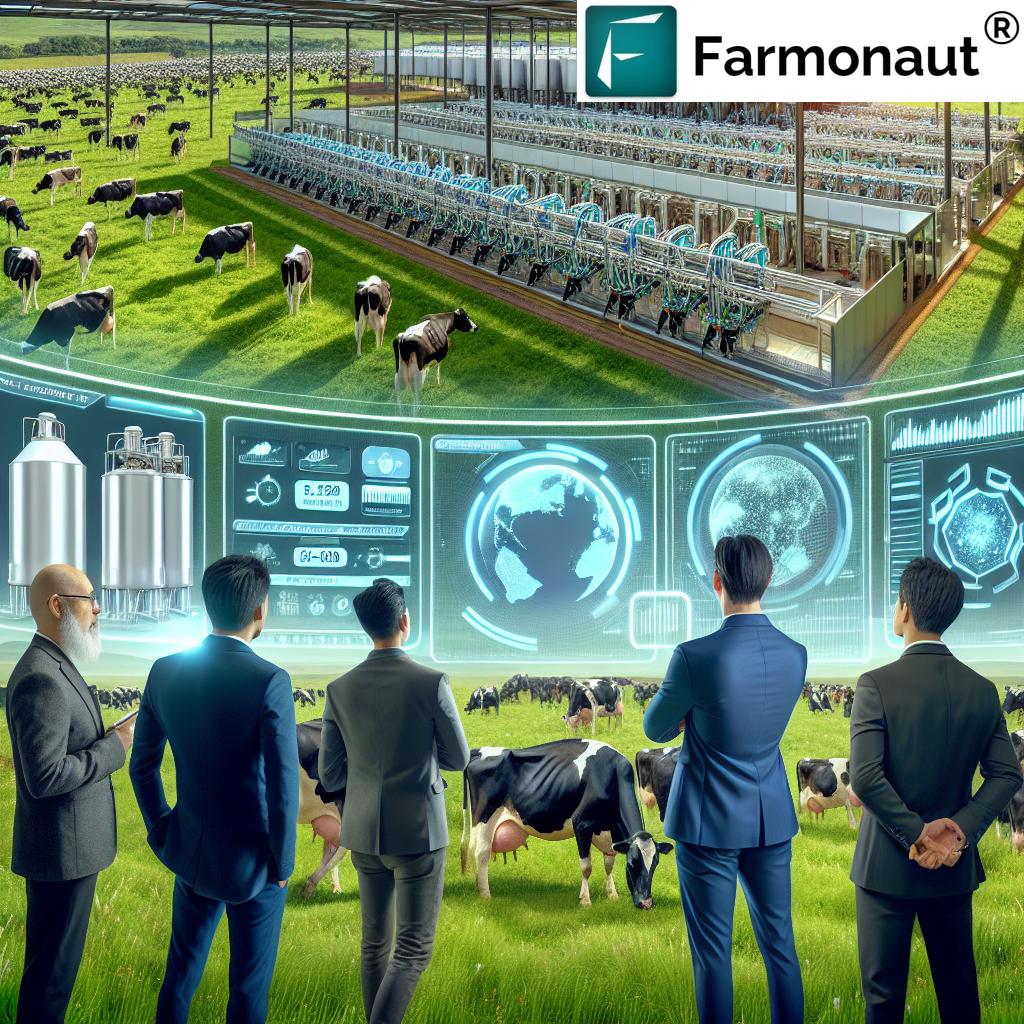Revolutionary Dairy Tech: FAO Chief Explores Australia’s Game-Changing SmartFarms for Sustainable Milk Production
Melbourne, Australia – In a groundbreaking visit that showcased the future of sustainable dairy innovation in Australia, FAO Director-General QU Dongyu recently embarked on an insightful journey through the country’s most advanced dairy farms. This FAO Director-General Australia visit highlighted the nation’s commitment to revolutionizing the dairy industry through cutting-edge technology and sustainable practices.

Ellinbank SmartFarm: A Glimpse into the Future of Dairy
The tour’s highlight was the Ellinbank SmartFarm, located 115 km southeast of Melbourne. This state-of-the-art facility is at the forefront of innovative dairy farming, focusing on:
- Boosting productivity through advanced feedbase management
- Improving cow health, welfare, and longevity
- Sustainably increasing annual milk production per cow
The SmartFarm technology for milk production demonstrated at Ellinbank is a game-changer in the industry. It integrates data-driven approaches with traditional farming practices, offering a blueprint for future dairy operations worldwide.
Interestingly, Director-General QU Dongyu suggested expanding the farm’s product range to include camel and buffalo milk, recognizing the growing global demand for diverse dairy options. This forward-thinking approach aligns perfectly with the innovative spirit of the SmartFarm.
Family Farms Embracing Innovation
The FAO delegation also visited a family-owned dairy farm, witnessing firsthand how smaller operations are adopting innovative practices. This visit highlighted the versatility of SmartFarm technology for milk production, demonstrating its applicability across various scales of dairy farming.
One of the most intriguing aspects was the farm’s use of multispecies pasture systems, a technique that enhances both productivity and sustainability. This approach is a prime example of how low-emissions farming techniques can be integrated into traditional dairy operations.
Biosecurity and Disease Preparedness: Safeguarding the Future
A crucial aspect of the FAO Director-General Australia visit was the tour of the Australian Centre for Disease Preparedness (ACDP). This high-containment facility, part of Australia’s Commonwealth Scientific and Industrial Research Organisation, plays a vital role in:
- Conducting research on dangerous infectious agents
- Providing policy advice and training
- Managing diagnosis, surveillance, and response to animal diseases
The ACDP’s status as a FAO Reference Centre for animal influenza, Newcastle Disease, and zoonotic coronavirus underscores its global importance in biosecurity research in the dairy industry and beyond.

Director-General QU Dongyu emphasized the need for ACDP to develop strategies that increase local engagement and foster closer, long-term collaboration with FAO. This vision aims to move beyond isolated projects towards comprehensive partnerships that maximize impact in animal disease preparedness.
Low-Emissions Farming: A Sustainable Future
The visit to the Kewleave Partnership, a low-emissions sheep and cattle farm, showcased Australia’s commitment to agricultural sustainability. This farm exemplifies how low-emissions farming techniques can be successfully implemented in livestock operations.
Key observations from this visit include:
- Balancing environmental responsibility with economic goals
- Utilizing data-driven approaches for informed decision-making
- Implementing strategies that reduce the carbon footprint of livestock farming
These practices demonstrate Australia’s leadership in developing sustainable milk production methods that can be adapted globally.
Explore Farmonaut’s Satellite Weather API for agricultural insights
Embracing Indigenous Knowledge in Agriculture
A significant aspect of the visit was the meeting with First Nation representatives, highlighting the importance of indigenous agriculture practices in modern farming. This session focused on:
- Engagement of Indigenous Peoples in agriculture, fisheries, and forestry
- Support for First Nations agribusiness ownership and employment
- Incorporation of Indigenous knowledge into sustainable farming practices
This inclusive approach aligns with FAO’s commitment to diversity and recognizes the valuable contributions of traditional knowledge to agricultural sustainability.
Youth in Agriculture: Shaping the Future
The FAO delegation’s participation in a roundtable hosted by the Future Farmers Network provided valuable insights into youth in agriculture. This discussion highlighted:
- Challenges faced by young people in the agricultural sector
- Opportunities for innovation and technology adoption
- The crucial role of youth in sustainable farming
Director-General QU Dongyu emphasized the importance of engaging young people in shaping the future of agriculture, recognizing their potential to drive innovation and sustainability in the sector.
Access Farmonaut’s API Developer Docs for advanced agricultural data integration
Conclusion: A New Era in Sustainable Dairy Farming
The FAO Director-General Australia visit has shed light on the remarkable advancements in sustainable dairy innovation in Australia. From the cutting-edge SmartFarms to the integration of indigenous knowledge and youth engagement, Australia is setting a new standard for sustainable milk production globally.
This visit underscores the importance of:
- Embracing technology in dairy farming for enhanced productivity and sustainability
- Integrating low-emissions techniques in livestock management
- Strengthening biosecurity measures and disease preparedness
- Incorporating indigenous knowledge and engaging youth in agricultural innovation
As the world faces growing challenges in food security and environmental sustainability, Australia’s innovative approaches in dairy farming offer valuable lessons and solutions that can be adapted worldwide. The collaboration between FAO and Australian agricultural institutions promises to drive further advancements in sustainable farming practices, ensuring a resilient and productive future for global agriculture.


